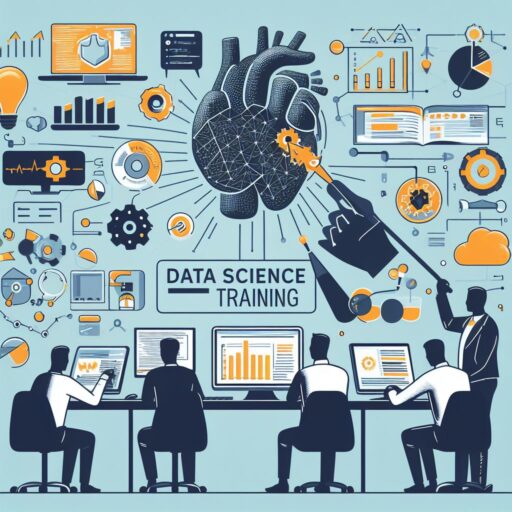Data science, once confined to the realms of IT and computer science, is now a critical skill set across diverse industries. For non-tech professionals looking to harness the power of data for informed decision-making, navigating the world of data science training can be a game-changer. This guide provides a comprehensive overview, outlining the key concepts, learning paths, and practical tips for non-tech professionals embarking on their data science training journey.
Understanding the Basics of Data Science
The first step for non-tech professionals diving into data science training is gaining a foundational understanding of what data science entails. At its core, data science involves extracting valuable insights and knowledge from structured and unstructured data. This process includes data collection, cleaning, analysis, and interpretation to drive informed decision-making. Non-tech professionals need not delve into complex coding languages initially; rather, grasping the overarching concepts and methodologies is paramount.
Concepts like descriptive statistics, which help in summarizing and describing essential features of a dataset, and inferential statistics, which draw conclusions and make predictions from data, lay the groundwork. Familiarity with key terms such as machine learning, predictive modeling, and data visualization sets the stage for non-tech professionals to navigate the broader landscape of data science.
Choosing the Right Learning Path
Data science training offers a variety of learning paths tailored to different professional needs. Non-tech professionals can explore options ranging from comprehensive online courses to focused workshops and certifications. Understanding the specific goals—whether it’s acquiring a broad understanding of data science principles or developing hands-on skills in data analysis—helps in selecting the most suitable learning path.
For beginners, introductory courses that cover the fundamentals of data science without delving into coding complexities can be an excellent starting point. Many platforms offer user-friendly interfaces for data analysis, allowing non-tech professionals to explore and visualize data without writing code. As proficiency grows, more advanced courses that introduce programming languages like Python or R become valuable for hands-on experience in data manipulation and analysis.
Practical Tips for Non-Tech Professionals
Embracing data science training as a non-tech professional comes with its set of challenges, but with the right approach, the journey can be both enjoyable and rewarding. Here are some practical tips to make the learning experience more effective:
1. Start with the Basics: Begin with introductory courses that cover the fundamental concepts of data science. Familiarize yourself with terms, methodologies, and the overall workflow of data analysis.
2. Explore User-Friendly Tools: Many data science tools and platforms are designed with user-friendly interfaces, allowing non-tech professionals to engage in data analysis without extensive coding. Platforms like Tableau, Microsoft Power BI, or Google Data Studio offer intuitive interfaces for visualization and analysis.
3. Focus on Applied Learning: Opt for courses that emphasize hands-on, applied learning. Practical projects and real-world case studies enable non-tech professionals to directly apply their knowledge, reinforcing the learning process.
4. Collaborate with Tech Colleagues: Building collaborative relationships with colleagues proficient in technical aspects of data science can provide valuable support. Learning from their experiences and seeking guidance on specific challenges enhances the overall learning journey.
5. Stay Updated with Industry Trends: Data science is a dynamic field, and staying updated with industry trends, new tools, and emerging methodologies is essential. Follow reputable blogs, participate in online forums, and attend webinars to stay informed about the latest developments.
Overcoming Challenges in Data Science Training
Non-tech professionals may encounter certain challenges during their data science training, but these hurdles can be overcome with a proactive mindset. The fear of coding, often a perceived barrier, can be addressed by starting with courses that use visual programming languages or platforms with drag-and-drop functionality. Additionally, recognizing that mastery comes with practice and persistence helps alleviate the pressure associated with learning technical skills.
Another challenge is the vastness of the data science landscape, with its numerous tools, techniques, and methodologies. Non-tech professionals can navigate this complexity by focusing on their specific learning goals and gradually expanding their knowledge base as they gain confidence.
Applying Data Science in Professional Roles
Once non-tech professionals have acquired foundational data science skills, the next step is applying this knowledge in their professional roles. Data-driven decision-making becomes a reality as professionals leverage data analysis to inform strategies, identify trends, and solve business challenges. This practical application of data science enhances the value non-tech professionals bring to their teams and organizations.
For instance, a marketing professional can use data science techniques to analyze customer behavior, optimize advertising strategies, and personalize marketing campaigns. In human resources, data science can aid in talent acquisition by identifying key skills and attributes for successful hires. The applications are diverse, spanning from finance and operations to healthcare and beyond.
Continual Learning and Skill Enhancement
Data science is an evolving field, and non-tech professionals must embrace a mindset of continual learning and skill enhancement. Advanced courses in machine learning, deep learning, and advanced statistical analysis become accessible and relevant as professionals progress in their data science journey. Staying curious, seeking out new challenges, and actively participating in the data science community contribute to ongoing growth and development.
Conclusion: Empowering Non-Tech Professionals in Data Science
Data science training for non-tech professionals is not merely a skill acquisition process; it’s a journey of empowerment. As professionals gain proficiency in data analysis, interpretation, and application, they become integral contributors to data-driven decision-making within their organizations. With the right resources, learning path, and mindset, non-tech professionals can unlock the transformative potential of data science and play a vital role in shaping the future of their respective industries.

